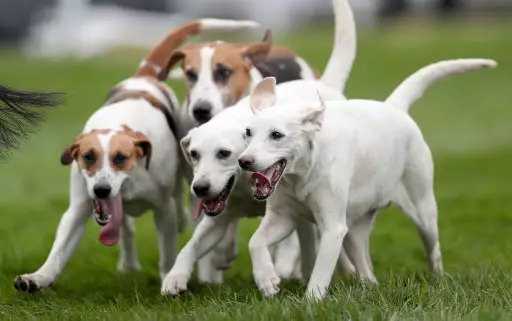
You'll often hear dog owners describe their domesticated beast as 'like a member of the family'. But given that they're mute members of the family, it can be quite difficult for us to really know what they're thinking.
That's not to say most of us don't boldly talk about said dog as though we do: "Ooooh my Patch absolutely knows exactly what we're talking about, don't ya Patch? And he always knows when we're going on holiday and he LOVES watching EastEnders."
But how well do we really know what our dogs are thinking? Can they understand what we're saying? Do they know we're going to come back from work? Can they really enjoy EastEnders? And is it OK to have sex in front of them?

To get some answers to these big questions, we spoke to Dr Sean O'Hara, lecturer in wildlife cognition and behaviour at the University of Salford.
Advert
The first thing the expert in dog cognition wanted to clear up was the importance of attempting to see the world from your pet's perspective when trying to understand them.
Speaking to LADbible, he said: "Humans are compulsive anthropomorphisers - the attaching of human mental attributes to animals. We can't help ourselves. But, that's not always helpful when trying to understand what our pets are doing or want.
"They have different sensory perceptions to humans so our first task is to try to understand how they perceive the world. Once we can think about how they perceive the world we can then begin to ask what they know about their world.
"In short, to understand animals we have to understand them on their terms, not our own. If you want to know what your pet is thinking, you have to think like your pet - and that's harder to do than it sounds."

Perhaps one of the most obvious ways in which we anthropomorphise our pets is by talking to them; be it a quick one-sided chat about your day or an hour-long rant about Brexit. It may be satisfying for us, but there isn't really much in it for our pets, who neither speak nor understand our language.
Advert
Focusing on pooches - the best of all pets - Dr O'Hara explained: "Most dog owners will tell you their dog understands every word they say. The truth is they do not. Owners think their dog understands sentences but dogs are just really good at reading them.
"What is true is that through the domestication process of dogs they are now adapted to be highly attentive to human-given cues, and they are excellent at learning. They learn to associate words and actions with outcomes - so from that standpoint it doesn't matter what the word is."
If you can't bear the thought that your dog hasn't understood a single word of your ramblings down the years, test it out next time you're about to take the dog out for a walk: go up and jangle the lead like usual and using that baby voice of yours say, 'Patch, wanna go for a dildo?!' ... See if they're any less excited than usual.
Dr O'Hara's research has found that dogs basically want four things from us: to be fed/watered, let in/out, and for us to retrieve their toy and pet them. By understanding this, owners can teach their dog to associate words with actions.
Advert
Dr O'Hara said: "If owners can learn to understand what their dog wants at a particular time it can be easy to induce that particular behaviour with an appropriate word or action. In other words a dog that is expecting to be taken out at a particular time of day can be made to quickly get to its feet with only the slightest of invitations - verbal or non-verbal and perhaps only partially completed.
"Dogs don't so much understand words, they've evolved to understand us."
What then of the heartbreaking part of the day when you leave the dog (or dogs if you're lucky) behind in the house and they do that po-faced whimpering: are they using their cuteness to their advantage or are they genuinely devastated every time we leave? Well, devastating news guys - it's the latter.

Dr O'Hara explained: "Today, although we now occupy the same social group, there's an issue in that we come from different evolutionary social group backgrounds.
Advert
"Humans live in a fission-fusion social system - one where, over the course of a single day, groups join, dissolve, fragment and meet up again, all with groupings of varying composition. Dogs have experienced this form of social living for a much shorter period of their evolutionary history than we, having evolved living in fully cohesive groups, i.e. ones that don't temporarily fragment.
"Social isolation is therefore often problematic to them and they can experience anxiety due to separation.
"It's also true that with dogs being social animals they are likely to feel less secure in those times they are left in social isolation. Social animals have be shown to crave social contact when isolated more than food."

So yeah, leaving for work every day just got even harder. What's more, dogs don't understand time, meaning 'when you leave you are gone from their world'. But before you go handing in your notice, consider the following consolation.
Advert
Dr O'Hara added: "Does that really mean that you no longer exist to your dog when you leave the room or go out to work for the day? Research suggests actually no.
"Although dogs don't appear to have an understanding of time, they do learn through simpler 'associative learning' means that you will return. Thus, anxiety is likely to be initially present but most dogs will learn - though not understand - that you will eventually return."
But enough of all this 'do dogs understand time and words' nonsense, the big question is - can we bonk in front of them? Obviously, most of us prefer not to get down to it with the dog watching on; it's weird, plus they may pass judgements on your interpretation and execution of doggy style.
But what about from the dog's perspective? Is it more damaging for them to be locked out of the action or bear witness to the debauchery?
Warily, I asked Dr O'Hara the weird question, on behalf of dog-conscious bonkers across the globe.
He said: "Humans are unusual amongst animals in seeking out privacy for intimacy. It's a human cultural phenomenon, which dogs of course have no awareness of, so why should it be a 'weird' situation for a dog?
"Dogs engage in social monitoring - essentially they are primed, on standby, watching us and waiting for what is happening for them next. Thus, shutting the dog out when it is expecting to be with its owner is likely to be more stressful for the dog."
However, if you can get over the weirdness from a human perspective of pounding with a pooch in the room, Dr O'Hara said you should 'prepare to be watched' - which perhaps explains the origins of the term dogging.
He said: "Since dogs are highly attentive to us they will be looking to see if some communicative command or gesture is coming their way. Additionally, be aware that coital activity is likely to generate smells and possibly fluids that some dogs may be inclined to want to closely inspect."
... I for one will be keeping the door closed.
Featured Image Credit: PATopics: News, Pets, Interesting, Animals, Dogs